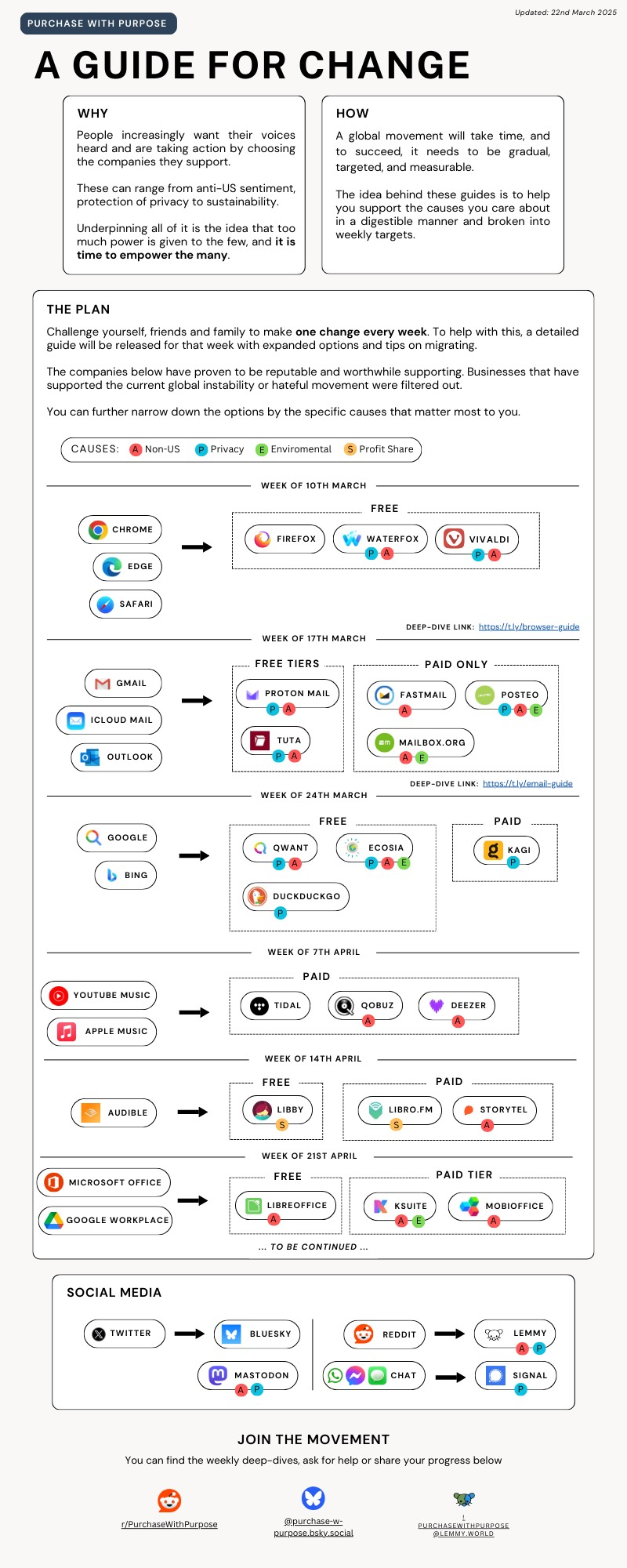As someone just starting their journey into privacy-focused, open-source software, I’d love to hear what apps the community recommends.
I’m particularly interested in:
- What messaging apps you use instead of WhatsApp/Messenger
- Alternatives to Google services (email, calendar, cloud storage)
- Social media alternatives that respect privacy
- Browsers
- Password managers worth using
- Any other productivity apps you’d recommend me to use
I’m using Apple devices (I know, I know), so apps that work well in this ecosystem would be ideal. Which ones have you found perform exceptionally well?
What was your experience transitioning away from corporate services? Any pitfalls to avoid or strategies that made the switch easier?
Have a look at https://www.privacyguides.org/en/. Their lists indicate OS/device compatibility and they also note any potential caveats.
i’m on android so…
- signal/telegram (still need telegram for community discussion).
- i use protonmail for personal stuff and tuta for professional stuff. still using google calendar since people i work with are using that. i use mega.
- lemmy?
- iceraven (firefox fork), still need chromium based like vivaldi.
- don’t know what to tell since i use android.
Telegram is not private at all. Its not even end to end encrypted unless you turn the feature on with direct messages. I would not recommend this as a private alternative especially considering they hand over messages to law enforcement after the creator was arrested and forced to.
If you use telegram just be aware it is absolutely not private.
My recommendation for you would to be to ditch the iOS device and get a Google Pixel phone and immediately flash it to GrapheneOS which de-googles it entirely.
Regarding privacy and security it is literally the best option considering it doesn’t send any telemetry to the underlying OS host servers like Apple and Google do.
On top of that, F-Droid and Accrescent are app stores for open source software only available for the android ecosystem that has no equivalent on iOS. Accrescent is specifically aimed towards security and privacy.
First, the Google Pixel has a multi-user function that, when utilized, allows the user to create multiple profiles (I believe it’s up to 32 on GrapheneOS) on the device which ensures separation between apps that you don’t want to talk to each other.
Like if you have Telegram you can put it on its own profile so it doesn’t collect data from your other apps and send it off to data brokers. It’s like having a brand new phone for every user.
Second, Molly-Foss is a hardened fork of Signal that is specific to android and doesnt contain any of Google’s proprietary code available only in F-Droid and Accrescent. Molly has passphrase encryption (a feature that Signal removed), can be used with , and has RAM Shredding for securely deleting sensitive information.
Secondly, F-Droid hosts apps like:
1.) Exodus: An privacy dashboard that lists all of your apps trackers and permissions so you can make informed decisions on the apps you keep on your phone. (I currently don’t have ANY apps that have trackers on my device). It also details what those trackers collect and a percentage of your apps that have that tracker.
2.) TrackerControl: Gives you granular control over all the trackers that your apps interact with (and even websites you visit which is extremely helpful in browsing the web more safely). It categorizes trackers by their function such as Advertising, Analytics, Fingerprinting, Email, Essential, Social, and Uncategorized and allows you to block each of them individually and allow certain ones that are required for the app or website to function.
3.) Privacy Browser: The name says it all but its a web browser based off of the android webview that minimizes the data that is sent to the internet and minimizes the amount of data that is stored on the device. It has built in tracker control, toggles for DOM Storage, Cookies, and JavaScript. You can also stream it through TOR, I2P, or your own proxy.
4.) Aurora Store: A private frontend for Google Play Store for apps that you can’t get on F-Droid that you feel you must have on your device. You can use the anonymous log in feature so you don’t need to have a google account to install apps. You can filter out apps that are reliant on Google Play Services as well that don’t have trackers built into them.
5.) PipePipe: A private frontend for YouTube that doesn’t allow Google to track you (unless you log in)
F-Droid has a TON of Free/Libre Open Source Software apps that aren’t creepy and respect your privacy. It includes a large selection of apps that you can self host on a server at home to replace most big tech services.
Third, you should look into self hosting your own services to replace big tech, it allows you to take control of your data and privacy
https://openalternative.co/self-hosted
https://github.com/awesome-selfhosted/awesome-selfhosted
Nextcloud is an amazing self hosted cloud service. Bitwarden or Keepass are also amazing password managers you can self host Bitwarden.
Otherwise, all fediverse apps for services like: Reddit: Lemmy (of course) using an app like Raccoon from F-Droid that doesn’t have any trackers. Instagram: Pixelfed using an app like PixelDroid from F-Droid that also doesn’t have any trackers. TikTok: Loops from loops.video Facebook/Twitter: Mastodon
And I’d be remiss to not mention Mullvad and ProtonVPN as private choices for VPN’s. They are not based in the US and you can pay for Mullvad in cash.
Tuta and Proton both have solid Email and Calendars.
Unfortunately, you don’t really have many good options for iOS.
Edit; now I went back and reread the question, I saw opens source. I will leave the comment as it could be a turnkey solution and stepping stone option to going full open source.
Something like a server on a raspberry pi could be what your after, but I don’t have specific software recommendations for it.
…
I’ve just started dabbling, so don’t consider this an expert, but a suggestion.
Synology nas’s have a focus on data sovereignty . They have Android apps that communicate from your phone to the Nas for media.
They can also be setup as a private cloud drive initially accessible by VPN to access and a email / web interface as well as instant messager and webdrive
I gave some though to setting up a small private ‘corporate’ style server where people could access . There’s no subscription fees after the initial hardware purchase as your self hosting.
Bitwarden is a good password manager, Signal or XMPP for messaging, you may want to get a VPN app
Coworker shared this with me. Keeping it going.

password-store is a CLI app to store passwords and even supports OTP.
Whoogle is a meta search (still uses Google search) that takes the bloat off.
Matrix is a decentralized and secure messaging platform.
For email I have a vps (costs less than protonmail) and use Maddy.
There are a few good firefox alternatives, I use waterfox on my phone and floorp on my Linux PC.
- Signal
- Proton services (mail, calendar, cloud, VPN)
- Mastodon, Lemmy
- Firefox w/ uBlock Origin
- Proton Pass or Bitwarden
That’s what I’d love to do. Sadly, it’s quite complicated to stick to those only. And I’m also a bit worried about what’s up with Proton recently.
What messaging apps you use instead of WhatsApp/MessengerSignal. I actually do use WA as well (peer pressure) but it’s registered to a separate phone/SIM and I use it almost exclusively through a desktop app. Neither have access to my address book!
Alternatives to Google services (email, calendar, cloud storage)I use a small local email provider. If that wasn’t an option I’d probably use mailbox.org.
Calendar and contacts: self-hosted CalDAV/CardDAV application. And since I do have a server, that’s also my cloud storage.Social media alternatives that respect privacyFediverse is private enough for me.
BrowsersLibrewolf
Password managers worth usingKeepassxc
Any other productivity apps you’d recommend me to useWhat are productivity apps?




